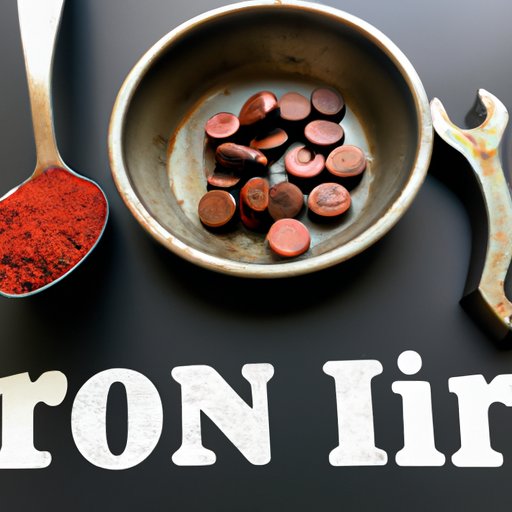I. Introduction
Iron is an essential nutrient for maintaining overall health and well-being. It is a critical component of hemoglobin, the protein in red blood cells that carries oxygen throughout the body. Iron is also necessary for producing energy and maintaining a healthy immune system. However, many people do not get enough iron from their diets, which can lead to iron deficiency anemia and other health problems.
The following article will explore various ways to increase iron levels quickly and effectively. We will discuss the importance of diet, iron supplements, cooking with cast iron, avoiding certain foods, and regular exercise. By incorporating some of these strategies into your daily routine, you can improve your iron levels and overall health.
II. Diet
The first and most effective way to increase iron levels is to incorporate more iron-rich foods into your diet. Some of the most common iron-rich foods include:
- Red meat, such as beef, pork, and lamb
- Poultry, such as chicken and turkey
- Seafood, such as oysters, clams, and shrimp
- Beans and legumes, such as kidney beans, lentils, and chickpeas
- Nuts and seeds, such as almonds, cashews, and pumpkin seeds
- Leafy green vegetables, such as spinach, kale, and collard greens
- Fortified cereals and breads
One easy way to incorporate some of these foods into your diet is to create delicious, iron-rich meals. Try these easy and healthy recipes:
- Spinach and feta omelet
- Grilled steak salad with mixed greens and cherry tomatoes
- Lentil and vegetable soup
- Roasted chicken with Brussels sprouts and sweet potatoes
- Quinoa and black bean salad with avocado
III. Iron Supplements
If you are not able to get enough iron from your diet, iron supplements can be a useful way to quickly restore iron levels. However, it is essential to choose the right type of supplement and take them responsibly.
There are two main types of iron supplements: ferrous and ferric. Ferrous iron supplements are the most commonly prescribed and are available over the counter. They come in a variety of forms, including tablets, capsules, and liquids. Ferric iron supplements are less commonly used and are only available with a prescription.
It is important to take iron supplements as directed by your doctor or pharmacist. Most supplements should be taken on an empty stomach, as food can interfere with absorption. It is also important to avoid taking supplements with dairy products, antacids, or other medications that can interfere with iron absorption. Be sure to stay within recommended dosages, as taking too much iron can cause serious health problems.
IV. Cooking with Cast Iron
Cooking with cast iron can be an easy and delicious way to increase iron intake. Cast iron cookware is durable and can last for generations. It is also an excellent conductor of heat, which allows for even cooking. Additionally, cooking with cast iron can add a small amount of iron to your food.
Here are a few iron-rich recipes that can be easily prepared using cast iron:
- Cast iron skillet steak with roasted vegetables
- Hearty vegetable chili
- Cast iron skillet pizza with spinach and feta
- Skillet cornbread with honey butter
- One-pan chicken and vegetables
V. Avoid Certain Foods
While it is important to incorporate iron-rich foods into your diet, there are also certain foods that can interfere with iron absorption. Some of the most common iron inhibitors include:
- Coffee and tea
- Dairy products
- High-fiber foods
- Processed foods
- Foods and beverages with tannins, such as red wine and black tea
If you consume these types of foods regularly, it is important to find alternative options that can help enhance iron absorption. For example:
- Choose herbal tea over coffee or black tea
- Limit the amount of dairy products you consume with iron-rich meals
- Avoid consuming high-fiber foods with iron-rich meals
- Choose fresh, whole foods over processed foods whenever possible
- Pair iron-rich meals with acidic foods or beverages, such as citrus fruits or tomato juice
VI. Regular Exercise
While diet and supplements are the most effective ways to increase iron levels, regular exercise can also play a role in improving overall iron levels in the body. Physical activity helps improve blood circulation and oxygen supply, which can enhance iron absorption. Some examples of types of exercise that can help increase oxygen levels include:
- Aerobic exercise, such as running, swimming, or cycling
- Resistance training, such as weight lifting or bodyweight exercises
- Dancing or other types of active movement
- Yoga or Pilates
It is important to find an exercise routine that works for you and to stick with it consistently.
VII. Conclusion
Iron is an essential nutrient for maintaining overall health and well-being. Unfortunately, many people do not get enough iron from their diets, which can lead to iron deficiency anemia and other health problems. By incorporating some of the strategies outlined in this article, such as incorporating iron-rich foods into your diet, taking iron supplements responsibly, cooking with cast iron, avoiding certain foods, and regular exercise, you can improve your iron levels and overall health.
Remember to consult with your doctor before beginning any new supplement or exercise regimen, particularly if you have a pre-existing health condition. With a few simple changes to your diet and lifestyle, you can increase your iron levels quickly and effectively.
